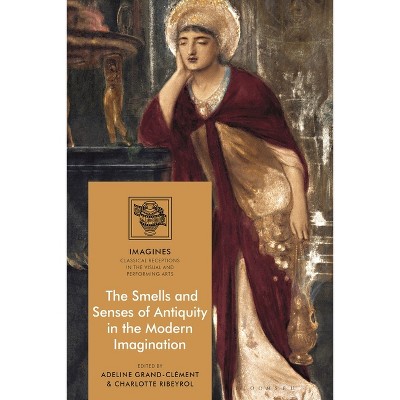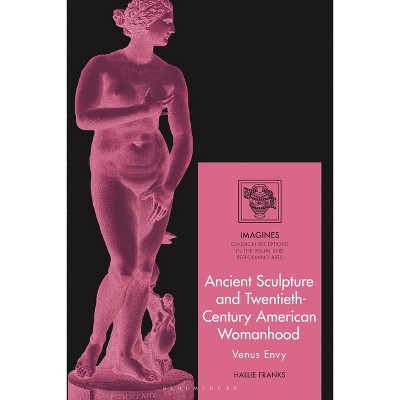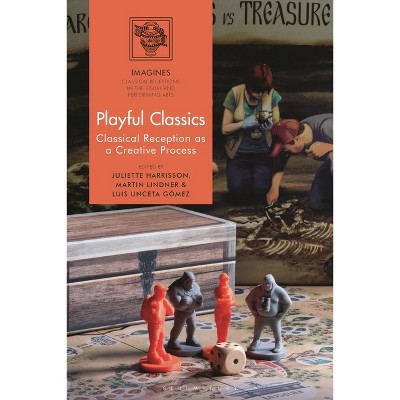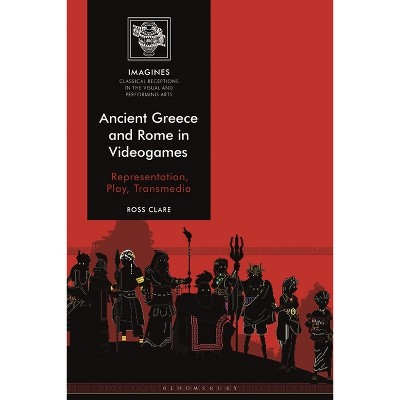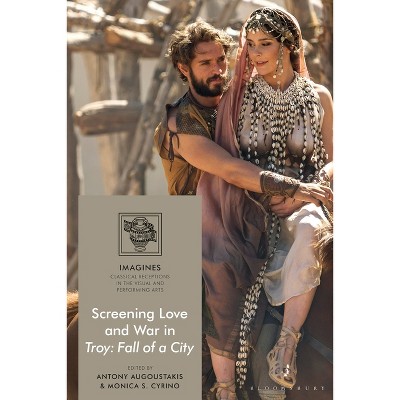Women in Classical Video Games - (Imagines - Classical Receptions in the Visual and Performing) by Jane Draycott & Kate Cook (Hardcover)

$135.99 when purchased online
Target Online store #3991
About this item
Highlights
- Despite the prevalence of video games set in or inspired by classical antiquity, the medium has to date remained markedly understudied in the disciplines of classics and ancient history, with the role of women in these video games especially neglected.
- About the Author: Jane Draycott is Lecturer in Ancient History at the University of Glasgow, UK.
- 288 Pages
- History, Ancient
- Series Name: Imagines - Classical Receptions in the Visual and Performing
Description
About the Book
"Despite the prevalence of video games set in or inspired by classical antiquity, the medium has to date remained markedly understudied in the disciplines of classics and ancient history, with the role of women in these video games especially neglected. Women in Classical Video Games seeks to address this imbalance as the first book-length work of scholarship to examine the depiction of women in video games set in classical antiquity. The volume surveys the history of women in these games and the range of figures presented from the 1980s to the present, alongside discussion of issues such as historical accuracy, authenticity, gender, sexuality, monstrosity, hegemony, race and ethnicity, and the use of tropes. A wide range of games of different types and modes are discussed, with particular attention paid to the Assassin's Creed franchise's 21st-century ventures into classical antiquity (first in Origins (2017), set in Hellenistic Egypt, and then in Odyssey (2018), set in classical Greece), which have caught the imagination not only of gamers, but also of academics, especially in relation to their accompanying educational Discovery Modes. The detailed case studies presented here form a compelling case for the indispensability of the medium to both reception studies and gender studies, and offer nuanced answers to such questions as how and why women are portrayed in the ways that they are"--Book Synopsis
Despite the prevalence of video games set in or inspired by classical antiquity, the medium has to date remained markedly understudied in the disciplines of classics and ancient history, with the role of women in these video games especially neglected. Women in Classical Video Games seeks to address this imbalance as the first book-length work of scholarship to examine the depiction of women in video games set in classical antiquity.The volume surveys the history of women in these games and the range of figures presented from the 1980s to the modern day, alongside discussion of issues such as historical accuracy, authenticity, gender, sexuality, monstrosity, hegemony, race and ethnicity, and the use of tropes. A wide range of games of different types and modes are discussed, with particular attention paid to the Assassin's Creed franchise's 21st-century ventures into classical antiquity (first in Origins (2017), set in Hellenistic Egypt, and then in Odyssey (2018), set in classical Greece), which have caught the imagination not only of gamers, but also of academics, especially in relation to their accompanying educational Discovery Modes. The detailed case studies presented here form a compelling case for the indispensability of the medium to both reception studies and gender studies, and offer nuanced answers to such questions as how and why women are portrayed in the ways that they are.
Review Quotes
"Cohesive, accessible and informative, illuminating the real-world issue of the video game industry's hostility towards women ... While the individual chapters are well written and thoroughly researched, the real strength of the book lies in the thematic interlinking and consistent dialogue between chapters, which provides readers with various perspectives on the key tropes, stereotypes and modes of representation used to portray ancient women." --The Classical Review
"Women in Classical Video Games is an excellent read not just for the variety of perspectives that it includes, the games that it discusses and the questions that it answers, but also because ultimately it mirrors the purpose of history itself, to document the past so that we may learn from it. By looking back at historical games with a critical eye we can begin to acknowledge and accept where we fell short and understand where, going forward, we can do better." --Historical Games Network "A sorely needed, intelligent and entertaining analysis of an understudied subject within an understudied medium." --Ross Clare, Teacher in Classics and Ancient History, University of Liverpool, UKAbout the Author
Jane Draycott is Lecturer in Ancient History at the University of Glasgow, UK.
Kate Cook is Associate Lecturer in Classics at the University of St Andrews, UK.Dimensions (Overall): 9.21 Inches (H) x 6.14 Inches (W) x .69 Inches (D)
Weight: 1.27 Pounds
Suggested Age: 22 Years and Up
Number of Pages: 288
Genre: History
Sub-Genre: Ancient
Series Title: Imagines - Classical Receptions in the Visual and Performing
Publisher: Bloomsbury Publishing PLC
Theme: General
Format: Hardcover
Author: Jane Draycott & Kate Cook
Language: English
Street Date: September 8, 2022
TCIN: 1004455794
UPC: 9781350241916
Item Number (DPCI): 247-26-2502
Origin: Made in the USA or Imported
If the item details above aren’t accurate or complete, we want to know about it.
Shipping details
Estimated ship dimensions: 0.69 inches length x 6.14 inches width x 9.21 inches height
Estimated ship weight: 1.27 pounds
We regret that this item cannot be shipped to PO Boxes.
This item cannot be shipped to the following locations: American Samoa (see also separate entry under AS), Guam (see also separate entry under GU), Northern Mariana Islands, Puerto Rico (see also separate entry under PR), United States Minor Outlying Islands, Virgin Islands, U.S., APO/FPO
Return details
This item can be returned to any Target store or Target.com.
This item must be returned within 90 days of the date it was purchased in store, shipped, delivered by a Shipt shopper, or made ready for pickup.
See the return policy for complete information.






